Challenges and Opportunities for Australian Auditing Profession
VerifiedAdded on 2023/03/17
|12
|3197
|99
Report
AI Summary
This report provides a comprehensive analysis of the Australian auditing profession, addressing the challenges and opportunities it faces in the 21st century. It begins by examining the statement that Australia's 'big four' accountancy firms should be under the spotlight of the banking royal commission, providing reasons for agreement with the statement. The report then discusses the opportunities for growth, such as the increasing significance of accounting and the cloud opportunity, as well as the challenges, including choosing the best software package and the impact of globalization. Furthermore, the report explores the recent regulatory attempts to improve audit quality in Australia, including the roles of the Financial Reporting Centre (FRC) and the Australian Securities and Investment Commission (ASIC). The report also highlights the ethical considerations and the influence of ethical codes on the auditing profession. Various cases and examples are utilized to evaluate the relevant issues concerning the AAP. The report concludes by emphasizing the need to address and improve the quality of auditing to ensure the reliability of financial statements.
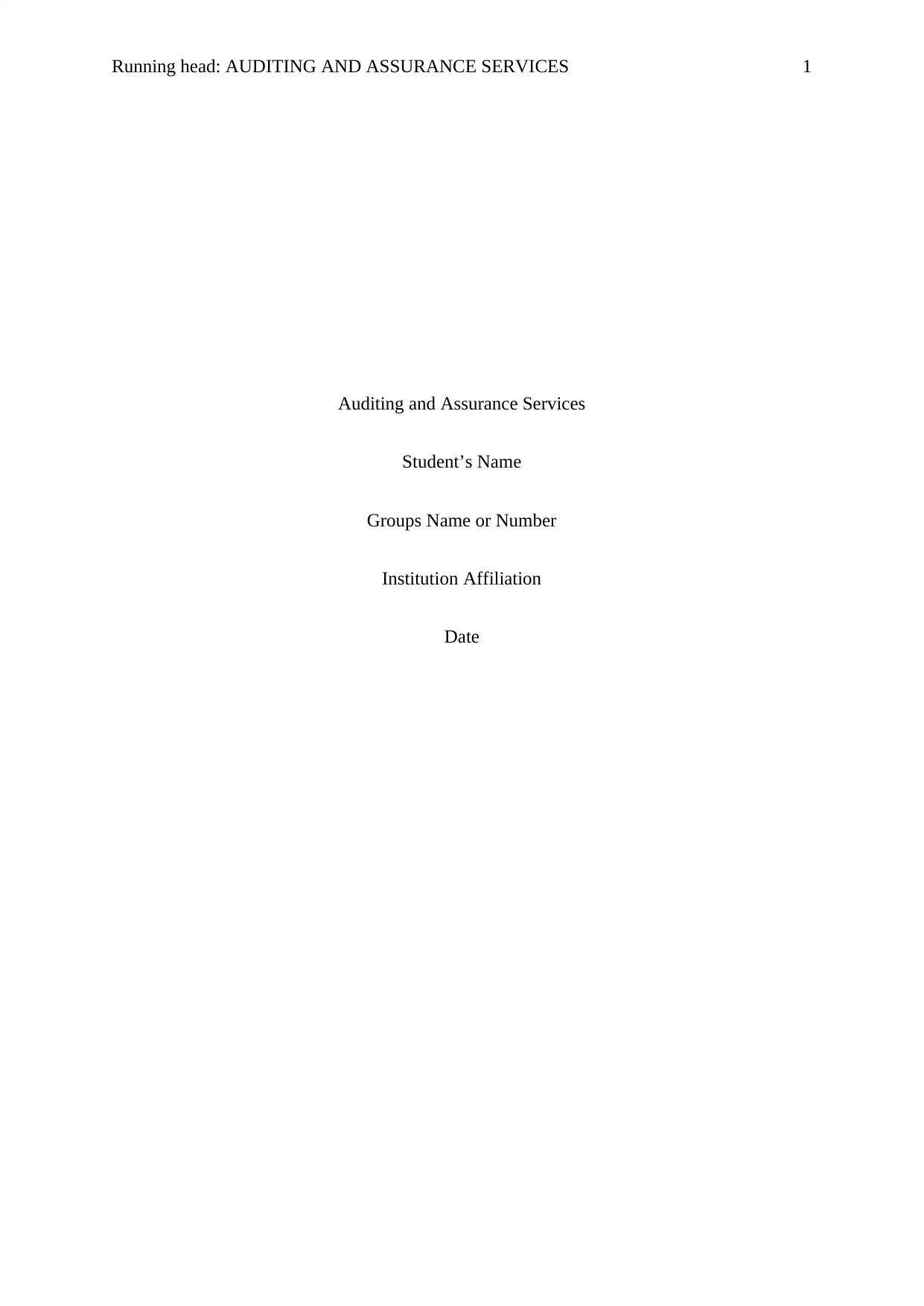
Running head: AUDITING AND ASSURANCE SERVICES 1
Auditing and Assurance Services
Student’s Name
Groups Name or Number
Institution Affiliation
Date
Auditing and Assurance Services
Student’s Name
Groups Name or Number
Institution Affiliation
Date
Paraphrase This Document
Need a fresh take? Get an instant paraphrase of this document with our AI Paraphraser
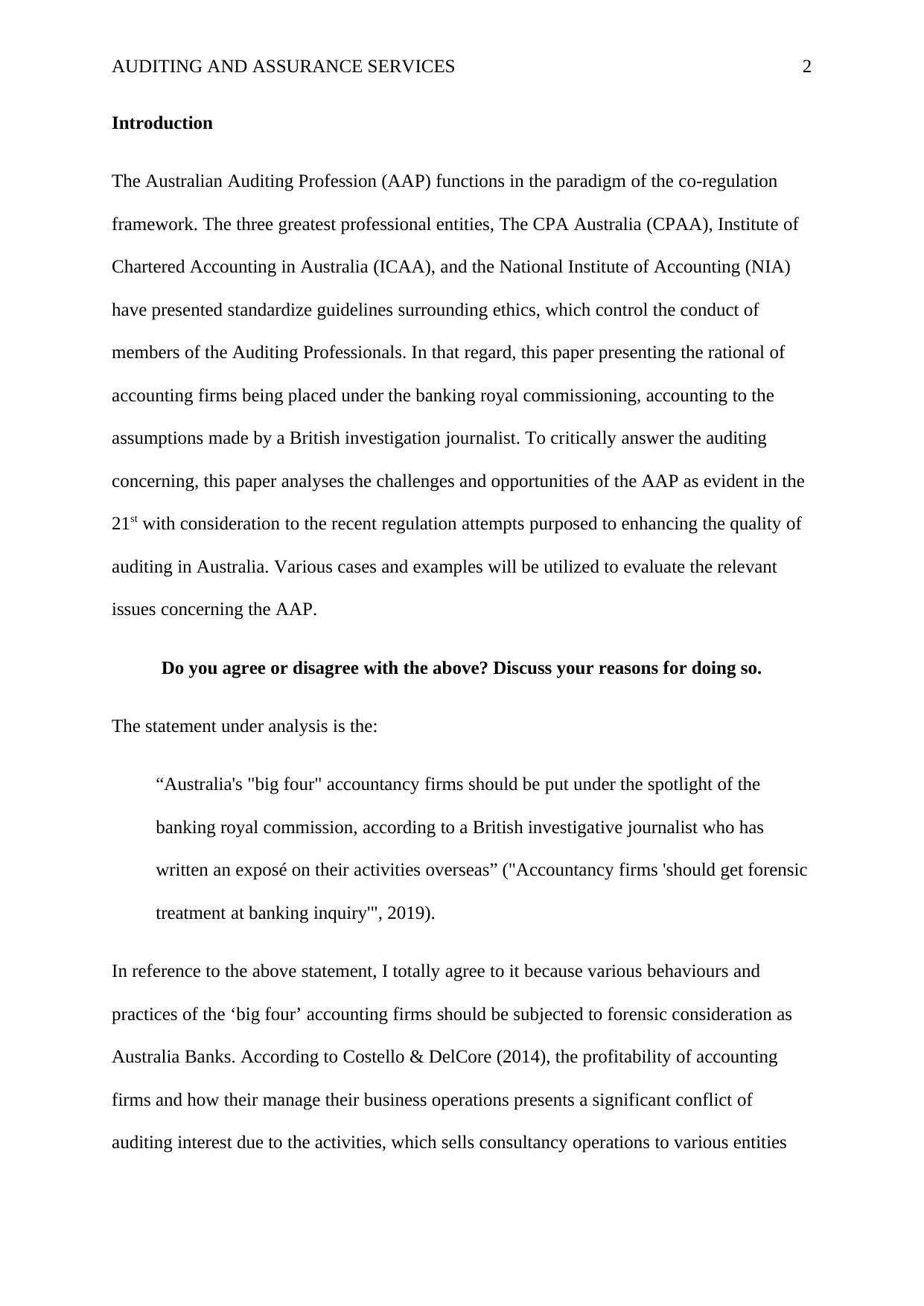
AUDITING AND ASSURANCE SERVICES 2
Introduction
The Australian Auditing Profession (AAP) functions in the paradigm of the co-regulation
framework. The three greatest professional entities, The CPA Australia (CPAA), Institute of
Chartered Accounting in Australia (ICAA), and the National Institute of Accounting (NIA)
have presented standardize guidelines surrounding ethics, which control the conduct of
members of the Auditing Professionals. In that regard, this paper presenting the rational of
accounting firms being placed under the banking royal commissioning, accounting to the
assumptions made by a British investigation journalist. To critically answer the auditing
concerning, this paper analyses the challenges and opportunities of the AAP as evident in the
21st with consideration to the recent regulation attempts purposed to enhancing the quality of
auditing in Australia. Various cases and examples will be utilized to evaluate the relevant
issues concerning the AAP.
Do you agree or disagree with the above? Discuss your reasons for doing so.
The statement under analysis is the:
“Australia's "big four" accountancy firms should be put under the spotlight of the
banking royal commission, according to a British investigative journalist who has
written an exposé on their activities overseas” ("Accountancy firms 'should get forensic
treatment at banking inquiry'", 2019).
In reference to the above statement, I totally agree to it because various behaviours and
practices of the ‘big four’ accounting firms should be subjected to forensic consideration as
Australia Banks. According to Costello & DelCore (2014), the profitability of accounting
firms and how their manage their business operations presents a significant conflict of
auditing interest due to the activities, which sells consultancy operations to various entities
Introduction
The Australian Auditing Profession (AAP) functions in the paradigm of the co-regulation
framework. The three greatest professional entities, The CPA Australia (CPAA), Institute of
Chartered Accounting in Australia (ICAA), and the National Institute of Accounting (NIA)
have presented standardize guidelines surrounding ethics, which control the conduct of
members of the Auditing Professionals. In that regard, this paper presenting the rational of
accounting firms being placed under the banking royal commissioning, accounting to the
assumptions made by a British investigation journalist. To critically answer the auditing
concerning, this paper analyses the challenges and opportunities of the AAP as evident in the
21st with consideration to the recent regulation attempts purposed to enhancing the quality of
auditing in Australia. Various cases and examples will be utilized to evaluate the relevant
issues concerning the AAP.
Do you agree or disagree with the above? Discuss your reasons for doing so.
The statement under analysis is the:
“Australia's "big four" accountancy firms should be put under the spotlight of the
banking royal commission, according to a British investigative journalist who has
written an exposé on their activities overseas” ("Accountancy firms 'should get forensic
treatment at banking inquiry'", 2019).
In reference to the above statement, I totally agree to it because various behaviours and
practices of the ‘big four’ accounting firms should be subjected to forensic consideration as
Australia Banks. According to Costello & DelCore (2014), the profitability of accounting
firms and how their manage their business operations presents a significant conflict of
auditing interest due to the activities, which sells consultancy operations to various entities
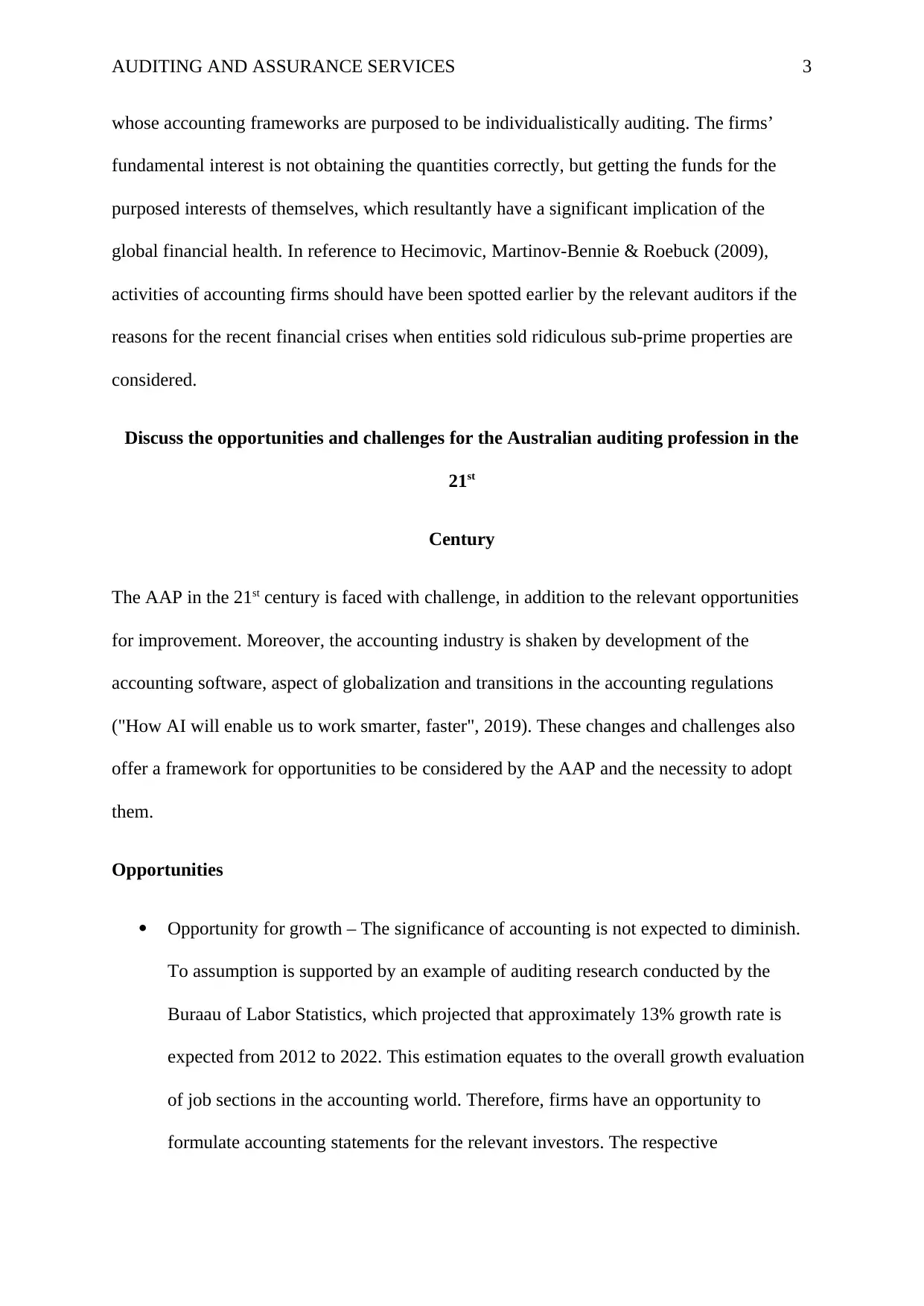
AUDITING AND ASSURANCE SERVICES 3
whose accounting frameworks are purposed to be individualistically auditing. The firms’
fundamental interest is not obtaining the quantities correctly, but getting the funds for the
purposed interests of themselves, which resultantly have a significant implication of the
global financial health. In reference to Hecimovic, Martinov-Bennie & Roebuck (2009),
activities of accounting firms should have been spotted earlier by the relevant auditors if the
reasons for the recent financial crises when entities sold ridiculous sub-prime properties are
considered.
Discuss the opportunities and challenges for the Australian auditing profession in the
21st
Century
The AAP in the 21st century is faced with challenge, in addition to the relevant opportunities
for improvement. Moreover, the accounting industry is shaken by development of the
accounting software, aspect of globalization and transitions in the accounting regulations
("How AI will enable us to work smarter, faster", 2019). These changes and challenges also
offer a framework for opportunities to be considered by the AAP and the necessity to adopt
them.
Opportunities
Opportunity for growth – The significance of accounting is not expected to diminish.
To assumption is supported by an example of auditing research conducted by the
Buraau of Labor Statistics, which projected that approximately 13% growth rate is
expected from 2012 to 2022. This estimation equates to the overall growth evaluation
of job sections in the accounting world. Therefore, firms have an opportunity to
formulate accounting statements for the relevant investors. The respective
whose accounting frameworks are purposed to be individualistically auditing. The firms’
fundamental interest is not obtaining the quantities correctly, but getting the funds for the
purposed interests of themselves, which resultantly have a significant implication of the
global financial health. In reference to Hecimovic, Martinov-Bennie & Roebuck (2009),
activities of accounting firms should have been spotted earlier by the relevant auditors if the
reasons for the recent financial crises when entities sold ridiculous sub-prime properties are
considered.
Discuss the opportunities and challenges for the Australian auditing profession in the
21st
Century
The AAP in the 21st century is faced with challenge, in addition to the relevant opportunities
for improvement. Moreover, the accounting industry is shaken by development of the
accounting software, aspect of globalization and transitions in the accounting regulations
("How AI will enable us to work smarter, faster", 2019). These changes and challenges also
offer a framework for opportunities to be considered by the AAP and the necessity to adopt
them.
Opportunities
Opportunity for growth – The significance of accounting is not expected to diminish.
To assumption is supported by an example of auditing research conducted by the
Buraau of Labor Statistics, which projected that approximately 13% growth rate is
expected from 2012 to 2022. This estimation equates to the overall growth evaluation
of job sections in the accounting world. Therefore, firms have an opportunity to
formulate accounting statements for the relevant investors. The respective
⊘ This is a preview!⊘
Do you want full access?
Subscribe today to unlock all pages.

Trusted by 1+ million students worldwide
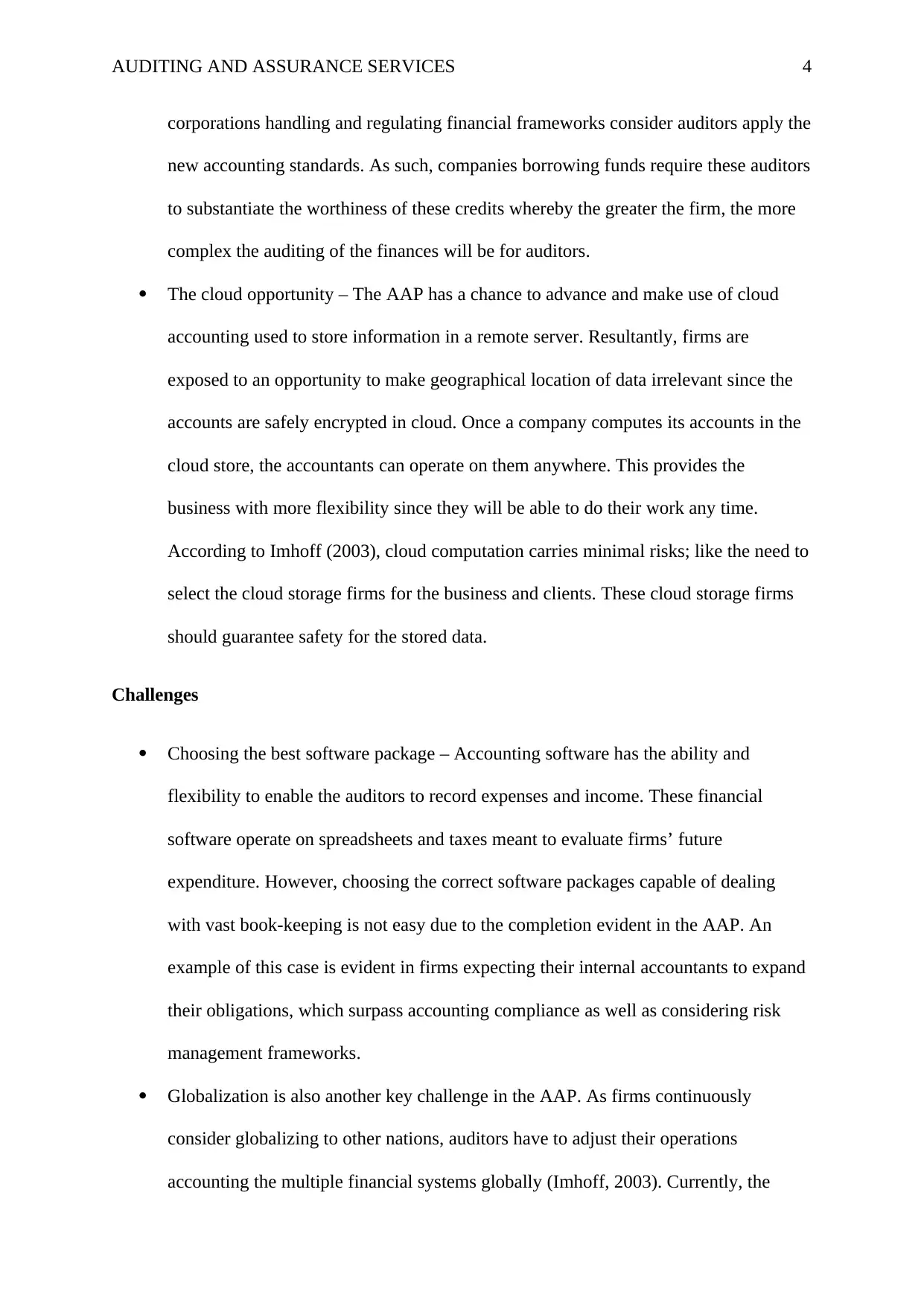
AUDITING AND ASSURANCE SERVICES 4
corporations handling and regulating financial frameworks consider auditors apply the
new accounting standards. As such, companies borrowing funds require these auditors
to substantiate the worthiness of these credits whereby the greater the firm, the more
complex the auditing of the finances will be for auditors.
The cloud opportunity – The AAP has a chance to advance and make use of cloud
accounting used to store information in a remote server. Resultantly, firms are
exposed to an opportunity to make geographical location of data irrelevant since the
accounts are safely encrypted in cloud. Once a company computes its accounts in the
cloud store, the accountants can operate on them anywhere. This provides the
business with more flexibility since they will be able to do their work any time.
According to Imhoff (2003), cloud computation carries minimal risks; like the need to
select the cloud storage firms for the business and clients. These cloud storage firms
should guarantee safety for the stored data.
Challenges
Choosing the best software package – Accounting software has the ability and
flexibility to enable the auditors to record expenses and income. These financial
software operate on spreadsheets and taxes meant to evaluate firms’ future
expenditure. However, choosing the correct software packages capable of dealing
with vast book-keeping is not easy due to the completion evident in the AAP. An
example of this case is evident in firms expecting their internal accountants to expand
their obligations, which surpass accounting compliance as well as considering risk
management frameworks.
Globalization is also another key challenge in the AAP. As firms continuously
consider globalizing to other nations, auditors have to adjust their operations
accounting the multiple financial systems globally (Imhoff, 2003). Currently, the
corporations handling and regulating financial frameworks consider auditors apply the
new accounting standards. As such, companies borrowing funds require these auditors
to substantiate the worthiness of these credits whereby the greater the firm, the more
complex the auditing of the finances will be for auditors.
The cloud opportunity – The AAP has a chance to advance and make use of cloud
accounting used to store information in a remote server. Resultantly, firms are
exposed to an opportunity to make geographical location of data irrelevant since the
accounts are safely encrypted in cloud. Once a company computes its accounts in the
cloud store, the accountants can operate on them anywhere. This provides the
business with more flexibility since they will be able to do their work any time.
According to Imhoff (2003), cloud computation carries minimal risks; like the need to
select the cloud storage firms for the business and clients. These cloud storage firms
should guarantee safety for the stored data.
Challenges
Choosing the best software package – Accounting software has the ability and
flexibility to enable the auditors to record expenses and income. These financial
software operate on spreadsheets and taxes meant to evaluate firms’ future
expenditure. However, choosing the correct software packages capable of dealing
with vast book-keeping is not easy due to the completion evident in the AAP. An
example of this case is evident in firms expecting their internal accountants to expand
their obligations, which surpass accounting compliance as well as considering risk
management frameworks.
Globalization is also another key challenge in the AAP. As firms continuously
consider globalizing to other nations, auditors have to adjust their operations
accounting the multiple financial systems globally (Imhoff, 2003). Currently, the
Paraphrase This Document
Need a fresh take? Get an instant paraphrase of this document with our AI Paraphraser
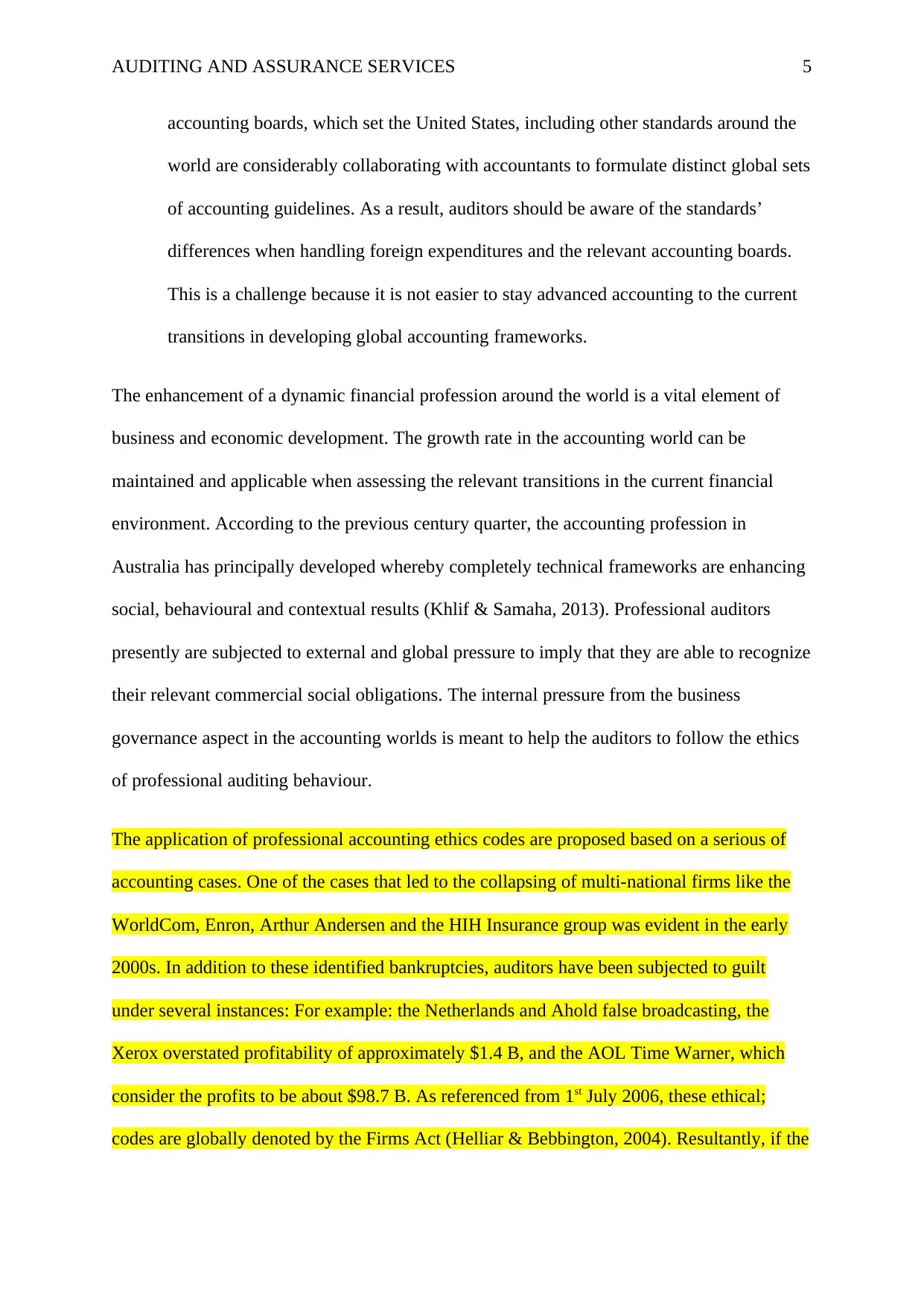
AUDITING AND ASSURANCE SERVICES 5
accounting boards, which set the United States, including other standards around the
world are considerably collaborating with accountants to formulate distinct global sets
of accounting guidelines. As a result, auditors should be aware of the standards’
differences when handling foreign expenditures and the relevant accounting boards.
This is a challenge because it is not easier to stay advanced accounting to the current
transitions in developing global accounting frameworks.
The enhancement of a dynamic financial profession around the world is a vital element of
business and economic development. The growth rate in the accounting world can be
maintained and applicable when assessing the relevant transitions in the current financial
environment. According to the previous century quarter, the accounting profession in
Australia has principally developed whereby completely technical frameworks are enhancing
social, behavioural and contextual results (Khlif & Samaha, 2013). Professional auditors
presently are subjected to external and global pressure to imply that they are able to recognize
their relevant commercial social obligations. The internal pressure from the business
governance aspect in the accounting worlds is meant to help the auditors to follow the ethics
of professional auditing behaviour.
The application of professional accounting ethics codes are proposed based on a serious of
accounting cases. One of the cases that led to the collapsing of multi-national firms like the
WorldCom, Enron, Arthur Andersen and the HIH Insurance group was evident in the early
2000s. In addition to these identified bankruptcies, auditors have been subjected to guilt
under several instances: For example: the Netherlands and Ahold false broadcasting, the
Xerox overstated profitability of approximately $1.4 B, and the AOL Time Warner, which
consider the profits to be about $98.7 B. As referenced from 1st July 2006, these ethical;
codes are globally denoted by the Firms Act (Helliar & Bebbington, 2004). Resultantly, if the
accounting boards, which set the United States, including other standards around the
world are considerably collaborating with accountants to formulate distinct global sets
of accounting guidelines. As a result, auditors should be aware of the standards’
differences when handling foreign expenditures and the relevant accounting boards.
This is a challenge because it is not easier to stay advanced accounting to the current
transitions in developing global accounting frameworks.
The enhancement of a dynamic financial profession around the world is a vital element of
business and economic development. The growth rate in the accounting world can be
maintained and applicable when assessing the relevant transitions in the current financial
environment. According to the previous century quarter, the accounting profession in
Australia has principally developed whereby completely technical frameworks are enhancing
social, behavioural and contextual results (Khlif & Samaha, 2013). Professional auditors
presently are subjected to external and global pressure to imply that they are able to recognize
their relevant commercial social obligations. The internal pressure from the business
governance aspect in the accounting worlds is meant to help the auditors to follow the ethics
of professional auditing behaviour.
The application of professional accounting ethics codes are proposed based on a serious of
accounting cases. One of the cases that led to the collapsing of multi-national firms like the
WorldCom, Enron, Arthur Andersen and the HIH Insurance group was evident in the early
2000s. In addition to these identified bankruptcies, auditors have been subjected to guilt
under several instances: For example: the Netherlands and Ahold false broadcasting, the
Xerox overstated profitability of approximately $1.4 B, and the AOL Time Warner, which
consider the profits to be about $98.7 B. As referenced from 1st July 2006, these ethical;
codes are globally denoted by the Firms Act (Helliar & Bebbington, 2004). Resultantly, if the
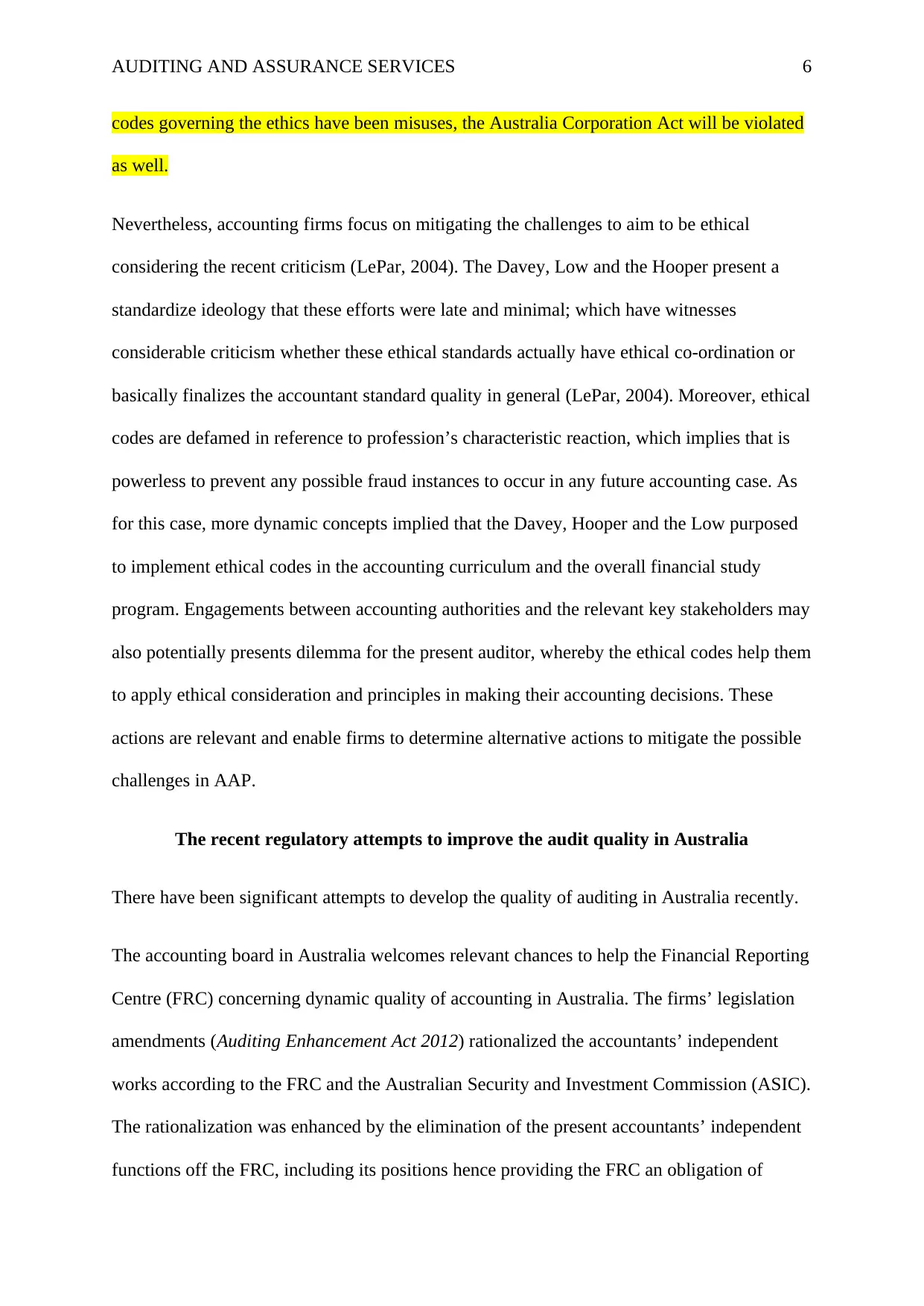
AUDITING AND ASSURANCE SERVICES 6
codes governing the ethics have been misuses, the Australia Corporation Act will be violated
as well.
Nevertheless, accounting firms focus on mitigating the challenges to aim to be ethical
considering the recent criticism (LePar, 2004). The Davey, Low and the Hooper present a
standardize ideology that these efforts were late and minimal; which have witnesses
considerable criticism whether these ethical standards actually have ethical co-ordination or
basically finalizes the accountant standard quality in general (LePar, 2004). Moreover, ethical
codes are defamed in reference to profession’s characteristic reaction, which implies that is
powerless to prevent any possible fraud instances to occur in any future accounting case. As
for this case, more dynamic concepts implied that the Davey, Hooper and the Low purposed
to implement ethical codes in the accounting curriculum and the overall financial study
program. Engagements between accounting authorities and the relevant key stakeholders may
also potentially presents dilemma for the present auditor, whereby the ethical codes help them
to apply ethical consideration and principles in making their accounting decisions. These
actions are relevant and enable firms to determine alternative actions to mitigate the possible
challenges in AAP.
The recent regulatory attempts to improve the audit quality in Australia
There have been significant attempts to develop the quality of auditing in Australia recently.
The accounting board in Australia welcomes relevant chances to help the Financial Reporting
Centre (FRC) concerning dynamic quality of accounting in Australia. The firms’ legislation
amendments (Auditing Enhancement Act 2012) rationalized the accountants’ independent
works according to the FRC and the Australian Security and Investment Commission (ASIC).
The rationalization was enhanced by the elimination of the present accountants’ independent
functions off the FRC, including its positions hence providing the FRC an obligation of
codes governing the ethics have been misuses, the Australia Corporation Act will be violated
as well.
Nevertheless, accounting firms focus on mitigating the challenges to aim to be ethical
considering the recent criticism (LePar, 2004). The Davey, Low and the Hooper present a
standardize ideology that these efforts were late and minimal; which have witnesses
considerable criticism whether these ethical standards actually have ethical co-ordination or
basically finalizes the accountant standard quality in general (LePar, 2004). Moreover, ethical
codes are defamed in reference to profession’s characteristic reaction, which implies that is
powerless to prevent any possible fraud instances to occur in any future accounting case. As
for this case, more dynamic concepts implied that the Davey, Hooper and the Low purposed
to implement ethical codes in the accounting curriculum and the overall financial study
program. Engagements between accounting authorities and the relevant key stakeholders may
also potentially presents dilemma for the present auditor, whereby the ethical codes help them
to apply ethical consideration and principles in making their accounting decisions. These
actions are relevant and enable firms to determine alternative actions to mitigate the possible
challenges in AAP.
The recent regulatory attempts to improve the audit quality in Australia
There have been significant attempts to develop the quality of auditing in Australia recently.
The accounting board in Australia welcomes relevant chances to help the Financial Reporting
Centre (FRC) concerning dynamic quality of accounting in Australia. The firms’ legislation
amendments (Auditing Enhancement Act 2012) rationalized the accountants’ independent
works according to the FRC and the Australian Security and Investment Commission (ASIC).
The rationalization was enhanced by the elimination of the present accountants’ independent
functions off the FRC, including its positions hence providing the FRC an obligation of
⊘ This is a preview!⊘
Do you want full access?
Subscribe today to unlock all pages.

Trusted by 1+ million students worldwide
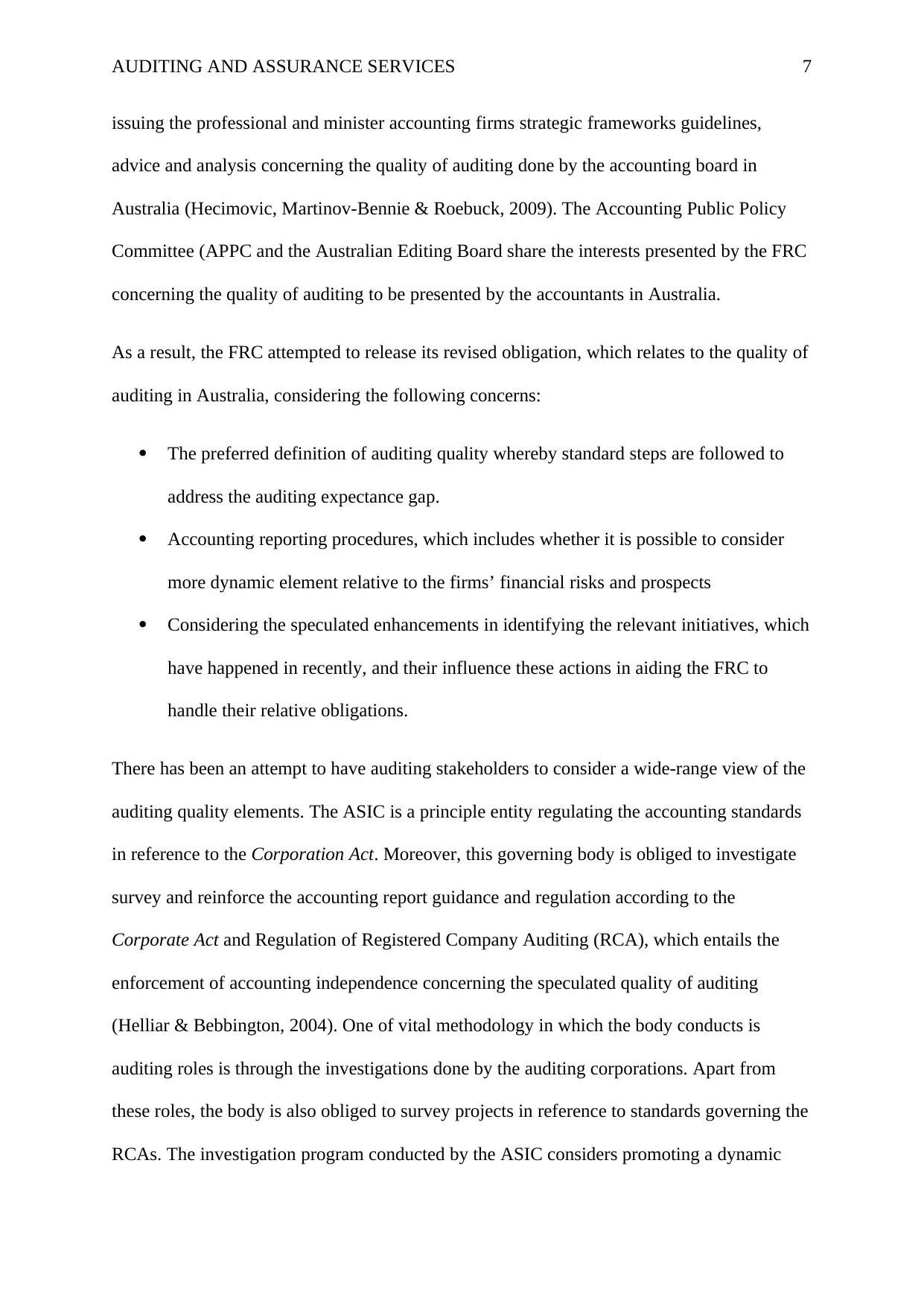
AUDITING AND ASSURANCE SERVICES 7
issuing the professional and minister accounting firms strategic frameworks guidelines,
advice and analysis concerning the quality of auditing done by the accounting board in
Australia (Hecimovic, Martinov-Bennie & Roebuck, 2009). The Accounting Public Policy
Committee (APPC and the Australian Editing Board share the interests presented by the FRC
concerning the quality of auditing to be presented by the accountants in Australia.
As a result, the FRC attempted to release its revised obligation, which relates to the quality of
auditing in Australia, considering the following concerns:
The preferred definition of auditing quality whereby standard steps are followed to
address the auditing expectance gap.
Accounting reporting procedures, which includes whether it is possible to consider
more dynamic element relative to the firms’ financial risks and prospects
Considering the speculated enhancements in identifying the relevant initiatives, which
have happened in recently, and their influence these actions in aiding the FRC to
handle their relative obligations.
There has been an attempt to have auditing stakeholders to consider a wide-range view of the
auditing quality elements. The ASIC is a principle entity regulating the accounting standards
in reference to the Corporation Act. Moreover, this governing body is obliged to investigate
survey and reinforce the accounting report guidance and regulation according to the
Corporate Act and Regulation of Registered Company Auditing (RCA), which entails the
enforcement of accounting independence concerning the speculated quality of auditing
(Helliar & Bebbington, 2004). One of vital methodology in which the body conducts is
auditing roles is through the investigations done by the auditing corporations. Apart from
these roles, the body is also obliged to survey projects in reference to standards governing the
RCAs. The investigation program conducted by the ASIC considers promoting a dynamic
issuing the professional and minister accounting firms strategic frameworks guidelines,
advice and analysis concerning the quality of auditing done by the accounting board in
Australia (Hecimovic, Martinov-Bennie & Roebuck, 2009). The Accounting Public Policy
Committee (APPC and the Australian Editing Board share the interests presented by the FRC
concerning the quality of auditing to be presented by the accountants in Australia.
As a result, the FRC attempted to release its revised obligation, which relates to the quality of
auditing in Australia, considering the following concerns:
The preferred definition of auditing quality whereby standard steps are followed to
address the auditing expectance gap.
Accounting reporting procedures, which includes whether it is possible to consider
more dynamic element relative to the firms’ financial risks and prospects
Considering the speculated enhancements in identifying the relevant initiatives, which
have happened in recently, and their influence these actions in aiding the FRC to
handle their relative obligations.
There has been an attempt to have auditing stakeholders to consider a wide-range view of the
auditing quality elements. The ASIC is a principle entity regulating the accounting standards
in reference to the Corporation Act. Moreover, this governing body is obliged to investigate
survey and reinforce the accounting report guidance and regulation according to the
Corporate Act and Regulation of Registered Company Auditing (RCA), which entails the
enforcement of accounting independence concerning the speculated quality of auditing
(Helliar & Bebbington, 2004). One of vital methodology in which the body conducts is
auditing roles is through the investigations done by the auditing corporations. Apart from
these roles, the body is also obliged to survey projects in reference to standards governing the
RCAs. The investigation program conducted by the ASIC considers promoting a dynamic
Paraphrase This Document
Need a fresh take? Get an instant paraphrase of this document with our AI Paraphraser
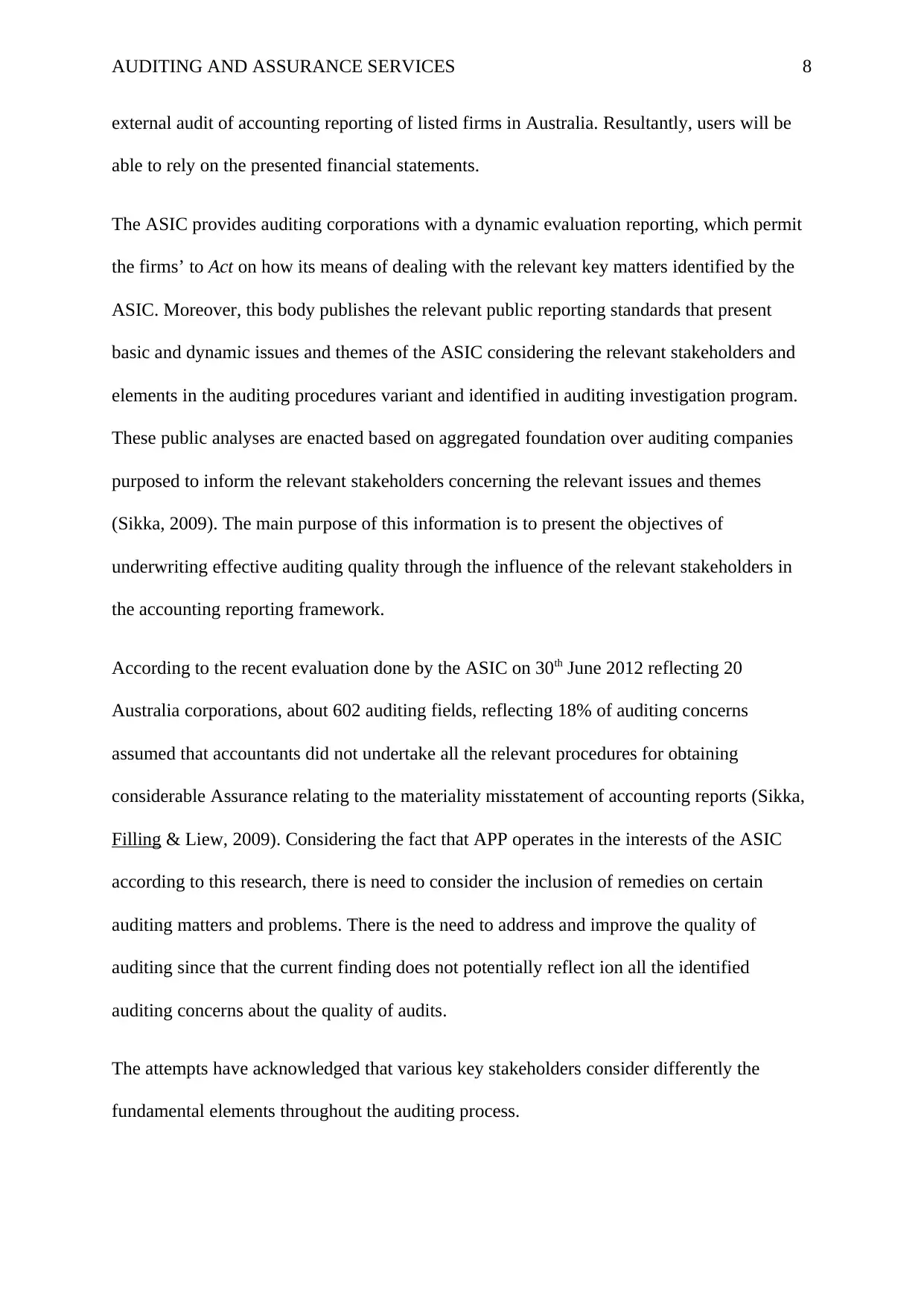
AUDITING AND ASSURANCE SERVICES 8
external audit of accounting reporting of listed firms in Australia. Resultantly, users will be
able to rely on the presented financial statements.
The ASIC provides auditing corporations with a dynamic evaluation reporting, which permit
the firms’ to Act on how its means of dealing with the relevant key matters identified by the
ASIC. Moreover, this body publishes the relevant public reporting standards that present
basic and dynamic issues and themes of the ASIC considering the relevant stakeholders and
elements in the auditing procedures variant and identified in auditing investigation program.
These public analyses are enacted based on aggregated foundation over auditing companies
purposed to inform the relevant stakeholders concerning the relevant issues and themes
(Sikka, 2009). The main purpose of this information is to present the objectives of
underwriting effective auditing quality through the influence of the relevant stakeholders in
the accounting reporting framework.
According to the recent evaluation done by the ASIC on 30th June 2012 reflecting 20
Australia corporations, about 602 auditing fields, reflecting 18% of auditing concerns
assumed that accountants did not undertake all the relevant procedures for obtaining
considerable Assurance relating to the materiality misstatement of accounting reports (Sikka,
Filling & Liew, 2009). Considering the fact that APP operates in the interests of the ASIC
according to this research, there is need to consider the inclusion of remedies on certain
auditing matters and problems. There is the need to address and improve the quality of
auditing since that the current finding does not potentially reflect ion all the identified
auditing concerns about the quality of audits.
The attempts have acknowledged that various key stakeholders consider differently the
fundamental elements throughout the auditing process.
external audit of accounting reporting of listed firms in Australia. Resultantly, users will be
able to rely on the presented financial statements.
The ASIC provides auditing corporations with a dynamic evaluation reporting, which permit
the firms’ to Act on how its means of dealing with the relevant key matters identified by the
ASIC. Moreover, this body publishes the relevant public reporting standards that present
basic and dynamic issues and themes of the ASIC considering the relevant stakeholders and
elements in the auditing procedures variant and identified in auditing investigation program.
These public analyses are enacted based on aggregated foundation over auditing companies
purposed to inform the relevant stakeholders concerning the relevant issues and themes
(Sikka, 2009). The main purpose of this information is to present the objectives of
underwriting effective auditing quality through the influence of the relevant stakeholders in
the accounting reporting framework.
According to the recent evaluation done by the ASIC on 30th June 2012 reflecting 20
Australia corporations, about 602 auditing fields, reflecting 18% of auditing concerns
assumed that accountants did not undertake all the relevant procedures for obtaining
considerable Assurance relating to the materiality misstatement of accounting reports (Sikka,
Filling & Liew, 2009). Considering the fact that APP operates in the interests of the ASIC
according to this research, there is need to consider the inclusion of remedies on certain
auditing matters and problems. There is the need to address and improve the quality of
auditing since that the current finding does not potentially reflect ion all the identified
auditing concerns about the quality of audits.
The attempts have acknowledged that various key stakeholders consider differently the
fundamental elements throughout the auditing process.
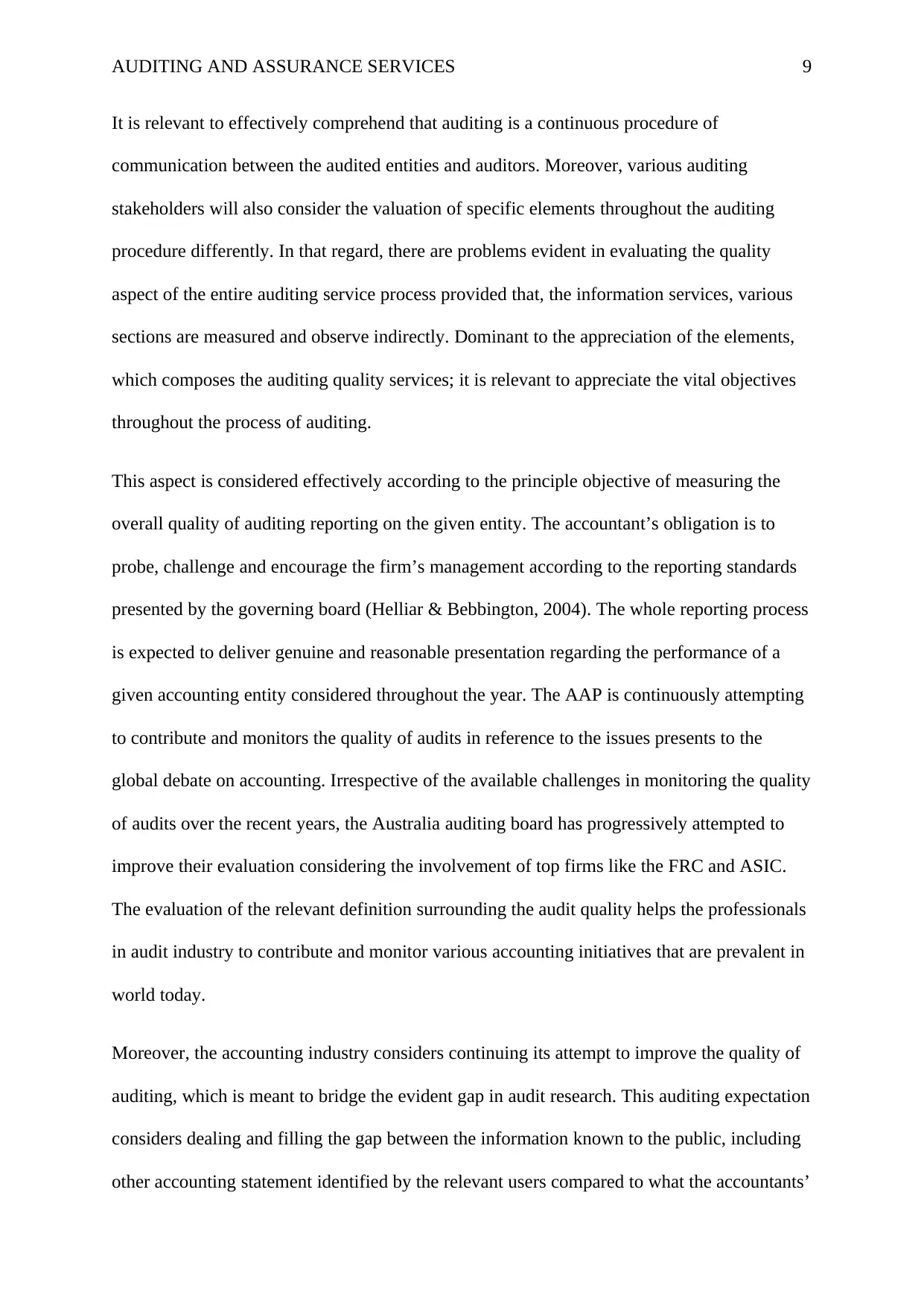
AUDITING AND ASSURANCE SERVICES 9
It is relevant to effectively comprehend that auditing is a continuous procedure of
communication between the audited entities and auditors. Moreover, various auditing
stakeholders will also consider the valuation of specific elements throughout the auditing
procedure differently. In that regard, there are problems evident in evaluating the quality
aspect of the entire auditing service process provided that, the information services, various
sections are measured and observe indirectly. Dominant to the appreciation of the elements,
which composes the auditing quality services; it is relevant to appreciate the vital objectives
throughout the process of auditing.
This aspect is considered effectively according to the principle objective of measuring the
overall quality of auditing reporting on the given entity. The accountant’s obligation is to
probe, challenge and encourage the firm’s management according to the reporting standards
presented by the governing board (Helliar & Bebbington, 2004). The whole reporting process
is expected to deliver genuine and reasonable presentation regarding the performance of a
given accounting entity considered throughout the year. The AAP is continuously attempting
to contribute and monitors the quality of audits in reference to the issues presents to the
global debate on accounting. Irrespective of the available challenges in monitoring the quality
of audits over the recent years, the Australia auditing board has progressively attempted to
improve their evaluation considering the involvement of top firms like the FRC and ASIC.
The evaluation of the relevant definition surrounding the audit quality helps the professionals
in audit industry to contribute and monitor various accounting initiatives that are prevalent in
world today.
Moreover, the accounting industry considers continuing its attempt to improve the quality of
auditing, which is meant to bridge the evident gap in audit research. This auditing expectation
considers dealing and filling the gap between the information known to the public, including
other accounting statement identified by the relevant users compared to what the accountants’
It is relevant to effectively comprehend that auditing is a continuous procedure of
communication between the audited entities and auditors. Moreover, various auditing
stakeholders will also consider the valuation of specific elements throughout the auditing
procedure differently. In that regard, there are problems evident in evaluating the quality
aspect of the entire auditing service process provided that, the information services, various
sections are measured and observe indirectly. Dominant to the appreciation of the elements,
which composes the auditing quality services; it is relevant to appreciate the vital objectives
throughout the process of auditing.
This aspect is considered effectively according to the principle objective of measuring the
overall quality of auditing reporting on the given entity. The accountant’s obligation is to
probe, challenge and encourage the firm’s management according to the reporting standards
presented by the governing board (Helliar & Bebbington, 2004). The whole reporting process
is expected to deliver genuine and reasonable presentation regarding the performance of a
given accounting entity considered throughout the year. The AAP is continuously attempting
to contribute and monitors the quality of audits in reference to the issues presents to the
global debate on accounting. Irrespective of the available challenges in monitoring the quality
of audits over the recent years, the Australia auditing board has progressively attempted to
improve their evaluation considering the involvement of top firms like the FRC and ASIC.
The evaluation of the relevant definition surrounding the audit quality helps the professionals
in audit industry to contribute and monitor various accounting initiatives that are prevalent in
world today.
Moreover, the accounting industry considers continuing its attempt to improve the quality of
auditing, which is meant to bridge the evident gap in audit research. This auditing expectation
considers dealing and filling the gap between the information known to the public, including
other accounting statement identified by the relevant users compared to what the accountants’
⊘ This is a preview!⊘
Do you want full access?
Subscribe today to unlock all pages.

Trusted by 1+ million students worldwide
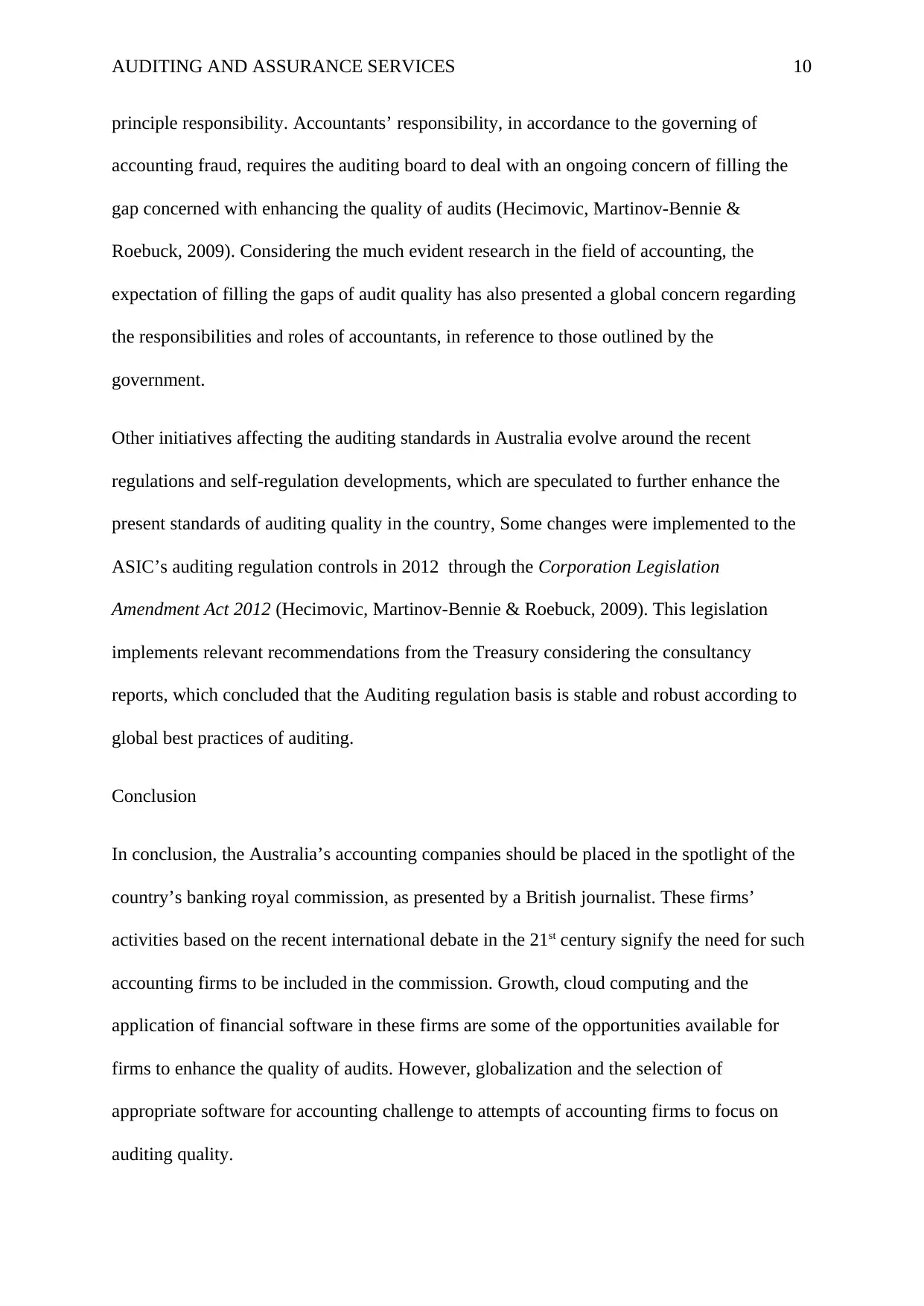
AUDITING AND ASSURANCE SERVICES 10
principle responsibility. Accountants’ responsibility, in accordance to the governing of
accounting fraud, requires the auditing board to deal with an ongoing concern of filling the
gap concerned with enhancing the quality of audits (Hecimovic, Martinov-Bennie &
Roebuck, 2009). Considering the much evident research in the field of accounting, the
expectation of filling the gaps of audit quality has also presented a global concern regarding
the responsibilities and roles of accountants, in reference to those outlined by the
government.
Other initiatives affecting the auditing standards in Australia evolve around the recent
regulations and self-regulation developments, which are speculated to further enhance the
present standards of auditing quality in the country, Some changes were implemented to the
ASIC’s auditing regulation controls in 2012 through the Corporation Legislation
Amendment Act 2012 (Hecimovic, Martinov-Bennie & Roebuck, 2009). This legislation
implements relevant recommendations from the Treasury considering the consultancy
reports, which concluded that the Auditing regulation basis is stable and robust according to
global best practices of auditing.
Conclusion
In conclusion, the Australia’s accounting companies should be placed in the spotlight of the
country’s banking royal commission, as presented by a British journalist. These firms’
activities based on the recent international debate in the 21st century signify the need for such
accounting firms to be included in the commission. Growth, cloud computing and the
application of financial software in these firms are some of the opportunities available for
firms to enhance the quality of audits. However, globalization and the selection of
appropriate software for accounting challenge to attempts of accounting firms to focus on
auditing quality.
principle responsibility. Accountants’ responsibility, in accordance to the governing of
accounting fraud, requires the auditing board to deal with an ongoing concern of filling the
gap concerned with enhancing the quality of audits (Hecimovic, Martinov-Bennie &
Roebuck, 2009). Considering the much evident research in the field of accounting, the
expectation of filling the gaps of audit quality has also presented a global concern regarding
the responsibilities and roles of accountants, in reference to those outlined by the
government.
Other initiatives affecting the auditing standards in Australia evolve around the recent
regulations and self-regulation developments, which are speculated to further enhance the
present standards of auditing quality in the country, Some changes were implemented to the
ASIC’s auditing regulation controls in 2012 through the Corporation Legislation
Amendment Act 2012 (Hecimovic, Martinov-Bennie & Roebuck, 2009). This legislation
implements relevant recommendations from the Treasury considering the consultancy
reports, which concluded that the Auditing regulation basis is stable and robust according to
global best practices of auditing.
Conclusion
In conclusion, the Australia’s accounting companies should be placed in the spotlight of the
country’s banking royal commission, as presented by a British journalist. These firms’
activities based on the recent international debate in the 21st century signify the need for such
accounting firms to be included in the commission. Growth, cloud computing and the
application of financial software in these firms are some of the opportunities available for
firms to enhance the quality of audits. However, globalization and the selection of
appropriate software for accounting challenge to attempts of accounting firms to focus on
auditing quality.
Paraphrase This Document
Need a fresh take? Get an instant paraphrase of this document with our AI Paraphraser
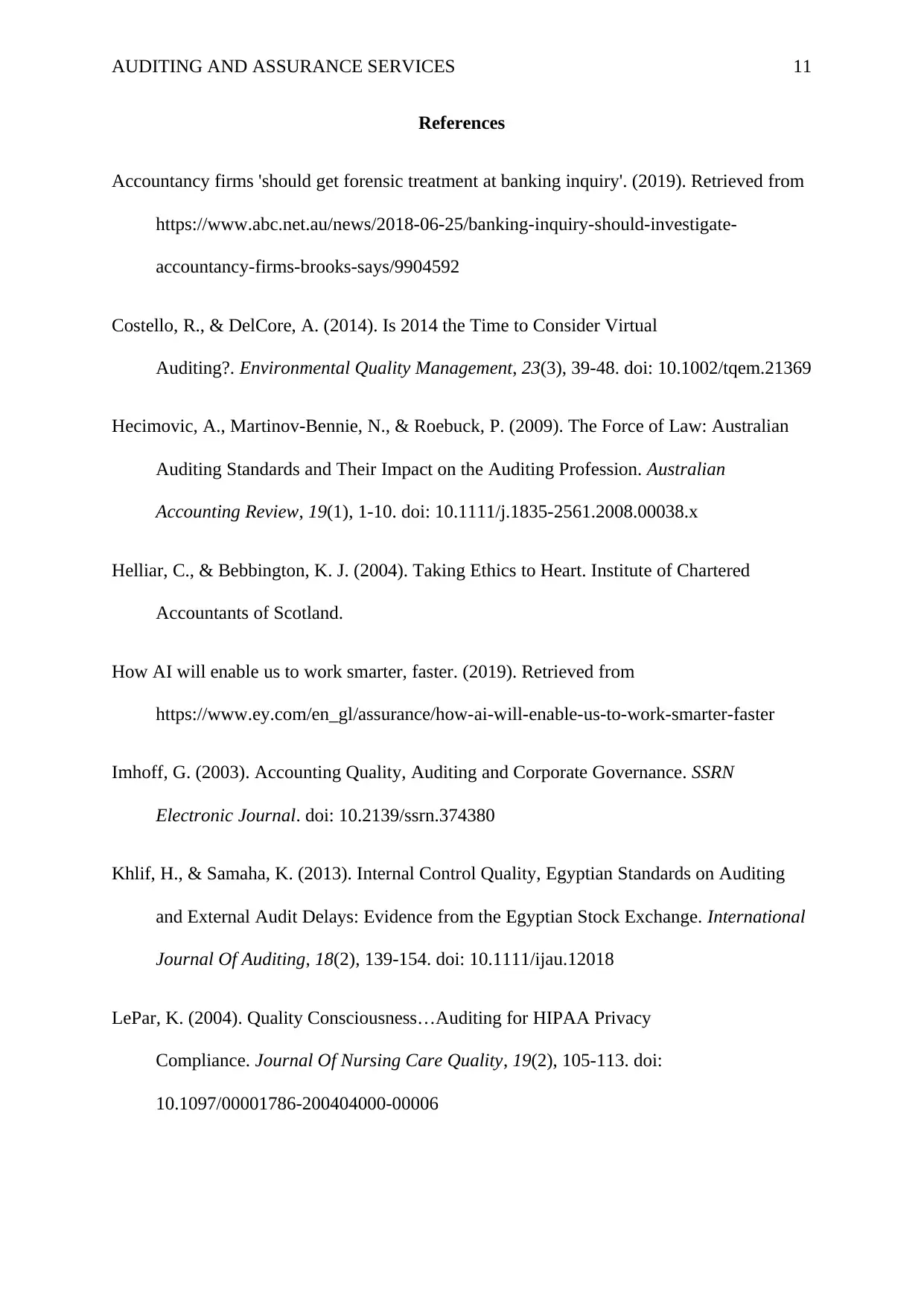
AUDITING AND ASSURANCE SERVICES 11
References
Accountancy firms 'should get forensic treatment at banking inquiry'. (2019). Retrieved from
https://www.abc.net.au/news/2018-06-25/banking-inquiry-should-investigate-
accountancy-firms-brooks-says/9904592
Costello, R., & DelCore, A. (2014). Is 2014 the Time to Consider Virtual
Auditing?. Environmental Quality Management, 23(3), 39-48. doi: 10.1002/tqem.21369
Hecimovic, A., Martinov-Bennie, N., & Roebuck, P. (2009). The Force of Law: Australian
Auditing Standards and Their Impact on the Auditing Profession. Australian
Accounting Review, 19(1), 1-10. doi: 10.1111/j.1835-2561.2008.00038.x
Helliar, C., & Bebbington, K. J. (2004). Taking Ethics to Heart. Institute of Chartered
Accountants of Scotland.
How AI will enable us to work smarter, faster. (2019). Retrieved from
https://www.ey.com/en_gl/assurance/how-ai-will-enable-us-to-work-smarter-faster
Imhoff, G. (2003). Accounting Quality, Auditing and Corporate Governance. SSRN
Electronic Journal. doi: 10.2139/ssrn.374380
Khlif, H., & Samaha, K. (2013). Internal Control Quality, Egyptian Standards on Auditing
and External Audit Delays: Evidence from the Egyptian Stock Exchange. International
Journal Of Auditing, 18(2), 139-154. doi: 10.1111/ijau.12018
LePar, K. (2004). Quality Consciousness…Auditing for HIPAA Privacy
Compliance. Journal Of Nursing Care Quality, 19(2), 105-113. doi:
10.1097/00001786-200404000-00006
References
Accountancy firms 'should get forensic treatment at banking inquiry'. (2019). Retrieved from
https://www.abc.net.au/news/2018-06-25/banking-inquiry-should-investigate-
accountancy-firms-brooks-says/9904592
Costello, R., & DelCore, A. (2014). Is 2014 the Time to Consider Virtual
Auditing?. Environmental Quality Management, 23(3), 39-48. doi: 10.1002/tqem.21369
Hecimovic, A., Martinov-Bennie, N., & Roebuck, P. (2009). The Force of Law: Australian
Auditing Standards and Their Impact on the Auditing Profession. Australian
Accounting Review, 19(1), 1-10. doi: 10.1111/j.1835-2561.2008.00038.x
Helliar, C., & Bebbington, K. J. (2004). Taking Ethics to Heart. Institute of Chartered
Accountants of Scotland.
How AI will enable us to work smarter, faster. (2019). Retrieved from
https://www.ey.com/en_gl/assurance/how-ai-will-enable-us-to-work-smarter-faster
Imhoff, G. (2003). Accounting Quality, Auditing and Corporate Governance. SSRN
Electronic Journal. doi: 10.2139/ssrn.374380
Khlif, H., & Samaha, K. (2013). Internal Control Quality, Egyptian Standards on Auditing
and External Audit Delays: Evidence from the Egyptian Stock Exchange. International
Journal Of Auditing, 18(2), 139-154. doi: 10.1111/ijau.12018
LePar, K. (2004). Quality Consciousness…Auditing for HIPAA Privacy
Compliance. Journal Of Nursing Care Quality, 19(2), 105-113. doi:
10.1097/00001786-200404000-00006
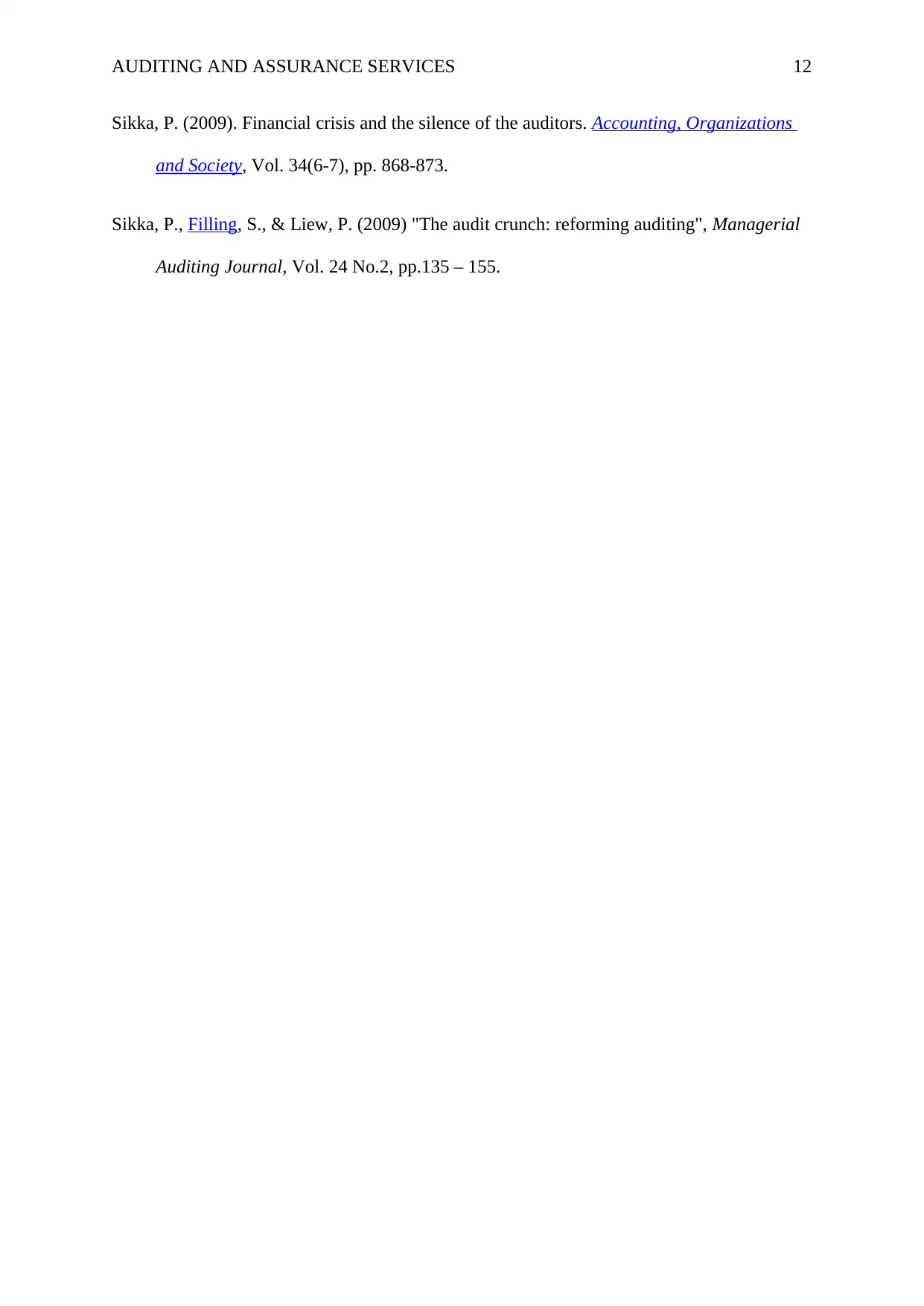
AUDITING AND ASSURANCE SERVICES 12
Sikka, P. (2009). Financial crisis and the silence of the auditors. Accounting, Organizations
and Society, Vol. 34(6-7), pp. 868-873.
Sikka, P., Filling, S., & Liew, P. (2009) "The audit crunch: reforming auditing", Managerial
Auditing Journal, Vol. 24 No.2, pp.135 – 155.
Sikka, P. (2009). Financial crisis and the silence of the auditors. Accounting, Organizations
and Society, Vol. 34(6-7), pp. 868-873.
Sikka, P., Filling, S., & Liew, P. (2009) "The audit crunch: reforming auditing", Managerial
Auditing Journal, Vol. 24 No.2, pp.135 – 155.
⊘ This is a preview!⊘
Do you want full access?
Subscribe today to unlock all pages.

Trusted by 1+ million students worldwide
1 out of 12
Related Documents
Your All-in-One AI-Powered Toolkit for Academic Success.
+13062052269
info@desklib.com
Available 24*7 on WhatsApp / Email
![[object Object]](/_next/static/media/star-bottom.7253800d.svg)
Unlock your academic potential
Copyright © 2020–2026 A2Z Services. All Rights Reserved. Developed and managed by ZUCOL.





